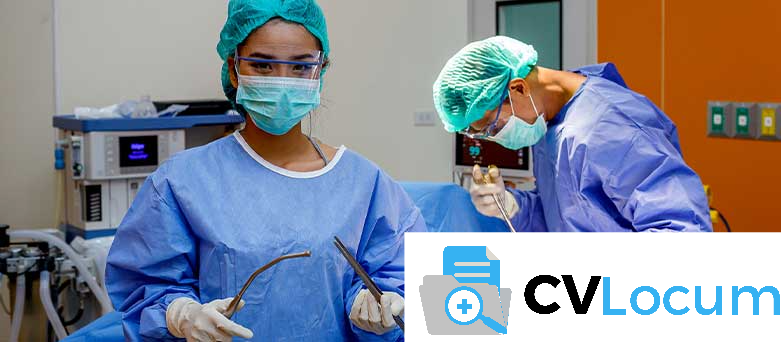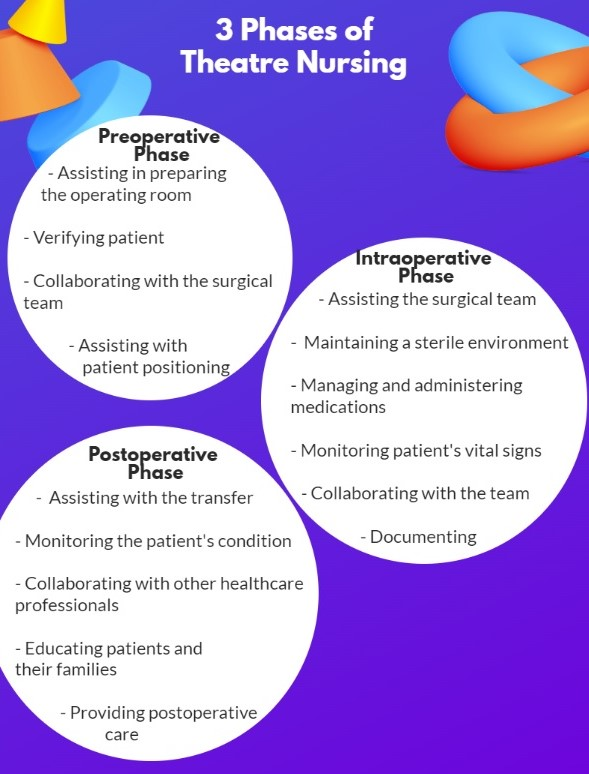
Are you interested in becoming a theatre nurse? Here’s everything you need to know about the qualifications, skills, and job openings for finding success in this field.
If you’re looking for a nursing career that offers a diverse range of roles and allows you to work in a dynamic, fast-paced, and rewarding surgical environment, then theatre nursing may be the perfect choice for you!
Theatre nurses work as part of an operating theatre team, managing the safe and efficient care of patients undergoing surgical procedures. In this blog post, we’ll explain what theatre nursing is, the skills needed to become a theatre nurse, the qualifications and training required, where to find theatre nursing job openings, career prospects, and the advantages and disadvantages of being a theatre nurse.
How to Become a Theatre Nurse
What qualifications do you need to become a theatre nurse?
To work as a theatre nurse, you must first become a registered nurse, whether that be child, mental health, adult or learning disability nurse and means completing a nursing degree or diploma. After this, you must undertake specialist training in theatre nursing degree. Specialist training programs are offered by a variety of providers, including further education colleges and hospitals.

What skills do I need to become a Theatre Nurse?
Theatre nursing is a highly specialised branch of nursing that requires a range of specialist skills. To become a successful theatre registered nurse, you will need strong communication, organisational, and time-management skills.
You will also need to be able to work well under pressure and be comfortable working in a fast-paced environment. Additionally, you should be highly adaptable and able to work with a variety of healthcare professionals and patients with varying needs.
What are the ideal soft skills for a theatre nurse?
Communication
Teamwork
Problem-solving
Adaptability
Attention to detail
Empathy and compassion to mental health
Time management
Resilience
Professionalism
Continuous learning

Developing skills to be a great theatre nurse
To be a great theatre nurse, you should focus on developing strong communication and teamwork skills to effectively collaborate with the surgical team and provide optimal patient care.
Additionally, honing your attention to detail, problem-solving abilities, and adaptability will help you navigate the dynamic and challenging environment of the operating theatre successfully.
What do Theatre Nursing jobs involve?
Being a theatre nurse in the UK involves working in the operating theatre alongside surgeons, operating department practitioners, anaesthetists, and other healthcare professionals. Theatre nurses play a crucial role in providing safe and effective patient care before, during, and after surgical procedures. Here are some key responsibilities and tasks involved in being a theatre nurse:

Preoperative Phase
– Assisting in preparing the operating room, ensuring it is clean, sterile, and properly equipped.
– Verifying patient identity, medical history, and surgical consent.
– Collaborating with the surgical team to plan the perioperative care.
– Assisting with patient positioning and preparing surgical instruments, specialist equipment, and supplies.
Intraoperative Phase
– Assisting the surgical team during procedures by providing instruments, supplies, and equipment as needed.
– Maintaining a sterile environment and ensuring adherence to infection control protocols.
– Managing and administering medications, including anesthetics, as directed by the anesthetist or surgeon.
– Monitoring the patient’s vital signs and responding to any changes or emergencies.
– Collaborating with the team to anticipate the needs of the surgeon during the procedure.
– Documenting accurate and detailed records of the surgical procedure.
Postoperative Phase
– Assisting with the transfer of the patient from the operating room to the recovery area.
– Monitoring the patient’s condition and vital signs during the immediate postoperative period.
– Providing postoperative care, including wound care, pain management, and administering medications.
– Educating patients and their families about postoperative care and discharge instructions.
– Collaborating with other healthcare professionals to ensure a smooth transition to the postoperative unit or ward.

What are the advantages and disadvantages of a career in Theatre Nursing?
There are many advantages to being a theatre nurse, including the opportunity to work in a dynamic and rewarding surgical environment, the chance to develop a range of specialist skills, and the ability to work in a team environment with other healthcare professionals.
However, there are also some disadvantages to being a theatre nurse, including limited patient contact, long periods of standing, and exposure to communicable diseases.

How much do theatre nurses get paid?
The salary for theatre nurses in the UK can vary depending on factors such as location, experience, and the specific healthcare organisation. It’s important to note that salary scales and rates are subject to change over time and may differ across regions.
Staff Theatre Nurse Average Salary:
The salary range for Theatre nurses in the UK typically starts around £25,000 per year. However, depending on factors such as experience, location, and additional responsibilities, the salary can go up to approximately £45,000.
Agency theatre nurse Average Salary:
Agency Theatre Nurses in the UK could expect to earn an hourly rate typically ranging from £25 to £35 translating to £45,000 to £65,000 providing you work full time hours.

What are the career prospects for a theatre nurse?
Theatre nursing offers excellent career prospects, with opportunities for training, development, and promotion throughout your career.
In addition, theatre nursing is in high demand, so there are usually plenty of job openings available.
As a theatre nurse, you could also become a surgical care practitioner or take on additional training to become a scrub nurse or circulating nurse.
Finally, what does the future of surgery and theatre nursing look like in the UK?
The future of surgery and theatre nursing in the UK is likely to be shaped by advancements in technology, evolving healthcare needs, and an increasing focus on patient-centred care.
It’s important to note that the future of surgery and theatre nursing is subject to advancements in medical science, healthcare policies, and technological innovations.
Embracing these changes and proactively adapting to new developments will be essential for theatre nurses to excel in their roles and contribute to the evolving landscape of surgical care in the UK.

Conclusion
Overall, becoming a theatre nurse can be an incredibly rewarding nursing career choice. With the right skills, qualifications, and training, you can take advantage of the opportunities available in this exciting field of nursing.
Whether you’re just starting your nursing career or are looking for a new challenge, becoming a theatre nurse might be the perfect choice for you.
Theatre Nurse Job Openings
There are many different avenues to find theatre nursing job openings. Many hospitals and healthcare facilities advertise job vacancies on their websites, while others make use of recruitment agencies to find suitable candidates.
If you are a registered nurse looking to take your career to the next level? CVlocum’s jobs board is an excellent resource for finding Theatre Nurse Roles that align with your aspirations. With its extensive database of healthcare vacancies, CVlocums offers a diverse range of opportunities to explore.
Alternatively, take a look at our user-friendly platform below:


[…] Become a Theatre Nurse – All You Need to Know & Theatre Nursing Job Openings | CVLocum […]